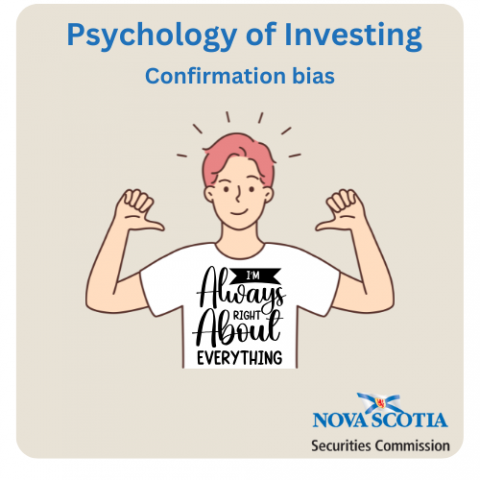Submitted by nsscadmin on

The sixth part of our psychology of investing series takes a closer look at confirmation bias. Are you open to changing your opinion on a situation? People tend to want to believe their opinions are consistent and correct. This strong desire to be right can affect how we process and gather information. This is confirmation bias, which impacts our desire to be right, even though information we’ve probably ignored could prove us wrong.
Due to confirmation bias people tend to seek out and favour, or even wrongly interpret information to confirm their existing beliefs. Confirmation bias can also cause people to dismiss information that challenges or disproves their beliefs.
Confirmation bias has become especially prevalent in recent years due to social media and the algorithms behind social media platforms. Confirmation bias is essentially being used through these algorithms to increase engagement with the platform. If you look at a specific topic, page, or even a specific person or company’s video on social media the algorithm will push out similar content to you. This will steadily and increasingly feed your confirmation bias because you are unlikely to see any dissimilar or contradictory information or content. Think about how this could affect investing information presented to you on social media.
Confirmation bias can also impact our relationship with other people including the partners and friends we choose. The people we connect with tend to have similar opinions, views, and beliefs.
When it comes to investing confirmation bias can cause investors to miss out on other investing opportunities. The bias can cause investors to stick with what they know, avoid looking at other information, and be less open or indifferent to other investing strategies.
Confirmation bias can also cause investors to fall into a herding mentality. If an investor plagued by confirmation bias believes a certain investment may be good and they find that “the herd” also believes it to be good, it will embolden their belief in that investment. Confirmation bias will often cause investors to seek out information that backs up their belief, instead of looking for non-biased information that may or may not agree with them.
If confirmation bias has caused you to make poor investment decisions in the past or you believe you are susceptible to confirmation bias, here are a few ways to protect yourself when investing.
Consider the alternative – If you believe that an investment is a good opportunity take a minute to also consider the negatives and whether it may in fact be a poor investment. Look at the pros and cons, and the risks, and how they stand up against your original belief. You may also want to bounce your idea off someone to get a more unbiased take.
Remember previous mistakes – If confirmation bias is clouding your judgement and making you overconfident in your decisions, think about a past instance when you were wrong. Remembering that you are not infallible can open your mind to new ideas and new sources of information to steer you away from confirmation bias influencing your decisions.
Our series on the psychology of investing continues in two weeks with Part 7 which looks at status quo bias.
